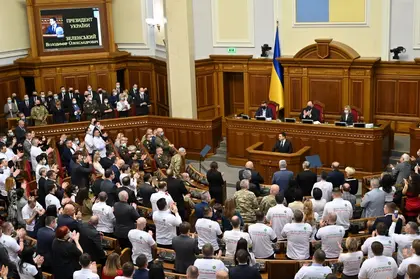The Verkhovna Rada of Ukraine has officially adopted all three laws and projects necessary for Ukraine to join the European Union.
To become a member of the EU, an applicant country is required to first meet conditions known as the Copenhagen Criteria, under The Treaty on European Union, which sets out the conditions and principles needed for accession.
JOIN US ON TELEGRAM
Follow our coverage of the war on the @Kyivpost_official.
The three criteria are:
Stability of institutions guaranteeing democracy, the rule of law, human rights and respect for and protection of minorities;
2. A functioning market economy and ability to cope with competitive pressure and market forces within the EU;
3. The ability to take on the obligations of membership, including the capacity to effectively implement the rules, standards and policies that make up the body of EU law (the ‘acquis’), and adherence to the aims of political, economic and monetary union.
Among the laws was the widely debated draft Law No. 2693, simply named “On Media,” relating to print-based, television, and online journalism. The bill had been criticized by some deputies and activists because it would remove restrictions on the Russian-language media industry.
On Tuesday, Dec. 13, People’s Deputy Yaroslav Zheleznyak posted on Telegram that 299 members of the parliament had voted in favor of the law: 195 members of President Zelensky’s Servant of the People party, 18 from the European solidarity party, 9 from Motherland, 15 from Platform for Life and Peace (what remained of the pro-Russian Opposition Bloc), 11 from For the Future, 14 from Voice, 15 from Trust, 12 from Restoration of Ukraine, and 10 independents.

EU Transfers €1.5 Bln Raised From Russian Assets for Ukraine
The People’s Deputy noted that “compromise positions were adopted,” including “regulating the status of the ‘Rada’ television channel (the channel becomes state-owned, must provide broadcasting of Parliament sessions, and during martial law and restrictions on live broadcasts the channel broadcasts recordings on the day of the plenary session).”
Zheleznyak also stated that “regulations regarding election legislation have been removed.”
“Regarding our obligations to Ukraine's candidacy to the EU, three out of three laws had been adopted,” he added. “The Law on National Minorities, competitive selection of judges of the Constitutional Court, and the Media Law.”
Yesterday’s passing of legislation brings Ukraine one step closer to joining the EU.
As a member, Ukraine would benefit from the free movement of goods, services and money among member states, along with its citizens being able to live and work anywhere within the union.
The EU can also provide grants to poorer nations within the union to strengthen their economy.
Just five days after Russia launched its brutal invasion of Ukraine, President Volodymyr Zelensky began the application process for Ukraine to become a member. He also warned that Russia would retaliate.
“Obviously, we should expect greater hostile activity from Russia,” he said in February. “And not only against Ukraine, but also against other European countries.”
Meanwhile, the Kremlin insisted that it had “nothing against” Ukraine joining the EU, but that it would be “observing it all thoroughly” in light of member states providing military, defense, and financial aid to Ukraine during the ongoing war.
For Ukraine’s application to be successful, the European Commission – the EU’s executive branch responsible for enforcing laws – will assess whether it is suitable to join. The stability of Ukraine’s economy, its human rights laws, and how democratic its government is are just some of the aspects that will be taken into consideration.
If successful, Ukraine must adopt all the EU’s laws and regulations, a process that normally takes several years. Ukraine would then sign a treaty which all other EU countries would need to formally approve.
You can also highlight the text and press Ctrl + Enter






